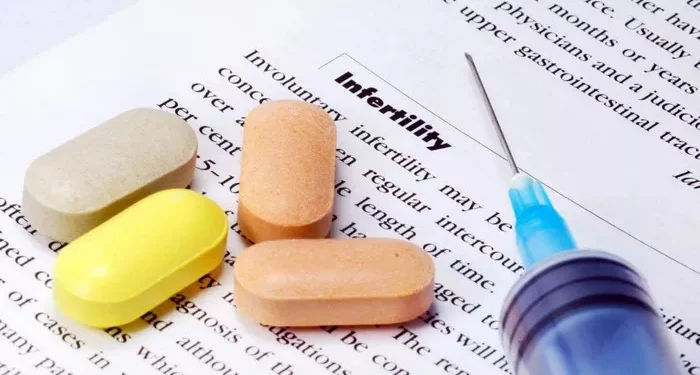Azoospermia, a condition where no sperm is found in a man’s ejaculate, affects about 1% of the male population and can be a significant cause of infertility. This condition is categorized into two main types: obstructive and non-obstructive azoospermia. Obstructive azoospermia occurs when there is a blockage in the male reproductive tract, preventing sperm from being present in the ejaculate despite normal sperm production in the testes. Non-obstructive azoospermia, on the other hand, results from a problem with sperm production within the testes themselves.
Treatment options for azoospermia depend on the type and underlying cause. While surgical interventions are common for obstructive azoospermia, certain cases of non-obstructive azoospermia may be amenable to medical treatment. This article explores the potential of medication as a treatment for azoospermia, focusing primarily on non-obstructive azoospermia.
Can Medication Help?
The potential effectiveness of medication in treating azoospermia largely depends on the underlying cause of the condition. In cases of non-obstructive azoospermia, where the issue lies with sperm production, medications can sometimes help stimulate the testes to produce sperm. Here are some common causes of non-obstructive azoospermia that might respond to medication:
Hormonal Imbalances: Hormonal imbalances can disrupt sperm production. Conditions such as hypogonadotropic hypogonadism, where there is a deficiency in the hormones that stimulate the testes to produce sperm, may be treated with hormone replacement therapy.
Infections: Certain infections can impair sperm production. Treating these infections with appropriate antibiotics may restore fertility.
Certain Medications: Some medications can negatively impact sperm production. Adjusting or discontinuing these medications under medical supervision may improve sperm counts.
While medication is less commonly used to treat obstructive azoospermia, it can sometimes be employed in conjunction with other treatments such as surgery to enhance outcomes.
See also: Severe Teratozoospermia Treatment
Types of Medications Used
Several types of medications may be used to treat azoospermia, particularly non-obstructive azoospermia. The choice of medication depends on the underlying cause of the condition. Here are some common medications and their functions:
Hormone Replacement Therapy (FSH, HCG): For men with hormonal imbalances, hormone replacement therapy can be beneficial. Follicle-stimulating hormone (FSH) and human chorionic gonadotropin (HCG) are commonly used to stimulate the testes to produce sperm. FSH directly stimulates the Sertoli cells in the testes to support spermatogenesis, while HCG mimics luteinizing hormone (LH), stimulating testosterone production which is crucial for sperm production.
Medications to Address Infections (Antibiotics): Infections of the reproductive tract can impair sperm production. Antibiotics are used to treat these infections, potentially restoring normal sperm production. Common antibiotics used include doxycycline and azithromycin, depending on the specific infection.
Medications to Address Inflammation: Inflammatory conditions affecting the testes or reproductive tract can lead to impaired sperm production. Anti-inflammatory medications, such as corticosteroids, can reduce inflammation and improve sperm production.
Success Rates and Additional Considerations
The success rates of medication in treating azoospermia vary and are generally moderate, depending on the cause of the condition. For instance, men with hormonal imbalances such as hypogonadotropic hypogonadism often respond well to hormone replacement therapy, with studies showing significant improvements in sperm production. However, the success of antibiotic treatments for infections depends on the type and severity of the infection.
Even with medication, some men may require additional treatments such as sperm retrieval techniques. These techniques, including testicular sperm extraction (TESE) and microdissection TESE (micro-TESE), can help retrieve sperm directly from the testes for use in assisted reproductive technologies like in vitro fertilization (IVF) and intracytoplasmic sperm injection (ICSI).
For men whose azoospermia does not respond to medication, alternative methods for achieving pregnancy are available. IVF and ICSI are commonly used in such cases. These techniques involve retrieving sperm from the testes and injecting a single sperm directly into an egg to achieve fertilization, which is then implanted into the female partner’s uterus.
See also: What is Asthenozoospermia
Conclusion
In summary, medication can be a viable treatment option for non-obstructive azoospermia, particularly when the condition is due to hormonal imbalances, infections, or the adverse effects of certain medications. Hormone replacement therapy, antibiotics, and anti-inflammatory medications are among the common treatments used. The success of these treatments varies depending on the underlying cause, and some men may still require additional procedures such as sperm retrieval techniques or assisted reproductive technologies to achieve pregnancy.
It is crucial for men with azoospermia to consult with a healthcare professional to determine the best course of treatment based on their specific condition. Even if medication is not successful, there are still effective options available for achieving pregnancy.
Disclaimer
This article is intended for informational purposes only and should not be used as a substitute for professional medical advice, diagnosis, or treatment. Always seek the guidance of a qualified healthcare provider with any questions you may have regarding a medical condition or treatment options.
Related Topics:
Reasons You May Not Be Ovulating Regularly: A Quick Guide
New Frontiers in Azoospermia Treatment: What You Need to Know
Obstructive Azoospermia Treatment: Helping Achieve Pregnancy



























